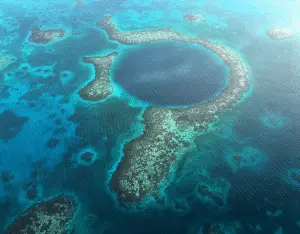Blue Hole Scuba Diving
Blue Holes have an alluring magnetism for all Scuba Divers. Despite the fact that these holes are extremely dangerous and risky, they still tempt divers from all around the world to undergo this breathtaking experience. For some divers, these holes take their breath forever. Diving there is very risky, and you need a lot of experience.

What is a Blue Hole?
It is a vertical submarine cave called because of its dark blue colour of waters. Usually, Blue Holes are very, very deep and roundish in shape. Different from shallow water, the huge deepness gives them a deep blue color they have. These Blue Holes were formed during the ice-ages when the sea-level was much lower than nowadays. Blue holes have a surface diameter that varies from 25 to 300 meters and you can even find them on Google earth.
Why are these Blue Holes so appealing for divers?
Those bold spirits are looking for an adrenalin rush byways of the stunning beauty that these Blue Holes provide. Deep and bottomless Blue Holes makes these great attractions for divers. There are no beautiful fishes or lovely coral in Blues Holes; you can see only vertical walls, sunshine on the surface-if you look up and dark blue- down as one looks down. The only things you can contemplate are limestone stalactites and stalagmites appearing here and there due to the natural chemical weathering processes. Only those very experienced in deep diving can risk trying these Blue Hole dives.
What should you know before diving into a Blue Hole?
First of all, you must know the depth as you can get extremely disoriented during the diving process. In the water, all can seem bigger and closer than reality. Often objects are seemed to be visually enlarged.
The second thing is your health. You have to know your limitation and the power of your breathing in urgent cases. If you are unlucky and get your timings wrong on deep depth dives, you can experience nitrogen narcosis. It is a reversible alteration of consciousness.
Good buoyancy control is another aspect you must have before diving Blue Holes.
It is well known that even some experienced divers have had their last dive in Blue Hole. For those who want to try their fate, we give this cautionary tale and reminder to take care of their lives. A diver’s ability to maintain good buoyancy will drastically affect every other aspect of their diving, from their air usage to their ability to assist other divers.
Good buoyancy is the mark of an experienced diver, yet it is often only taught to a basic standard in the open water level of tuition. The rest is left to the diver to pick up as they go.
Blue Hole Scuba Diving Sites

There are some famous Blue Holes well known in the diving fraternity. For example, The Great Blue Hole Lighthouse Reef Atoll in Belize is one of them. Its depth is over 120 metres. This particular Blue Holes became world famous thanks to a French naval officer, explorer and scientist Jacques-Yves Cousteau as he placed it into the 10 top list of Blue Holes for scuba diving. Even though this hole is situated away from civilization as its about 96 km from Belize, it still remains today as one of the most popular holes for recreational scuba diving. Divers have an opportunity to dive into the crystal clear water and meet several species of fish, like nurse-sharks, giant groupers, Caribbean reef shark and the Blacktip sharks.
Another interesting Blue Hole is located on east Sinai, a few kilometres north of Dahab in Egypt- on the coast of the Red Sea. The Hole is around 130 meters deep. You can see the beautiful Arch at a depth of 52-55 met; this has now been well documented in film and is a remarkable site to see. The Hole itself and the neighbouring area has an abundance of reef fish and beautiful corals. This Blue Hole is also known as the “Divers cemetery”. There are no official records given, but the number of fatalities is around 200 over recent years, according to Theguardian.
Final Words
Blue Holes are a wonderful piece of nature on our Planet. They are beautiful, mysterious but can be dangerous for human beings. You might be an experienced diver, you may have dived hundreds of times, but scuba diving in Blue Holes is a totally different experience. Let us take care of the Blue Holes as well as taking care of our lives while we visit them!
